General
Shafik Senkubuge Overcomes Financial Difficulties to Become First-Class Graduate
Published
1 year agoon
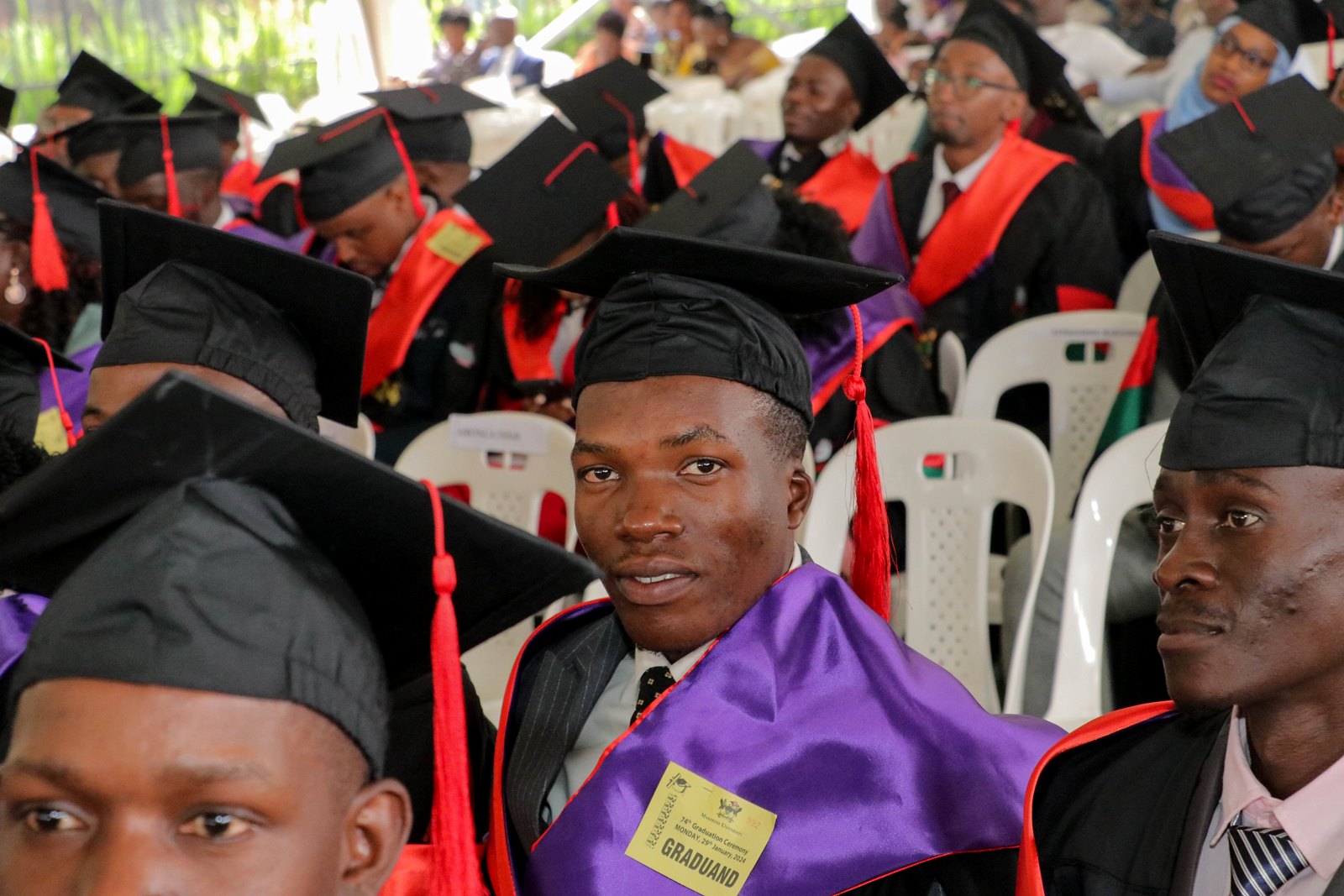
Shafik Senkubuge, 24, is set to graduate from the Makerere University with a Degree of Bachelor of Environmental Health Science on January 29. Before becoming one of #Mak74thGrad’s stars from the College of Health Sciences (MakCHS), he faced financial constraints and personal challenges, but found the wisdom and resilience for his academic prowess to shine brightly.
He graduates with a Cumulative Grade Point Average (CGPA) of 4.46 out of 5.00 (First Class Honors) qualifying him to be on the Vice Chancellor’s List. As a practice in Makerere University School of Public Health, he receives an award for the meritorious completion from the Vice Chancellor, Prof. Barnabas Nawangwe.
Senkubuge entered MakSPH, after he missed his dream course, Bachelor of Medicine and Bachelor of Surgery due to low points. He had obtained 15 points in Biology (03), Chemistry (04), Mathematics (o6) plus a point in ICT and General Paper (GP) at Mengo Senior School, despite having set himself a target to make 19 points.
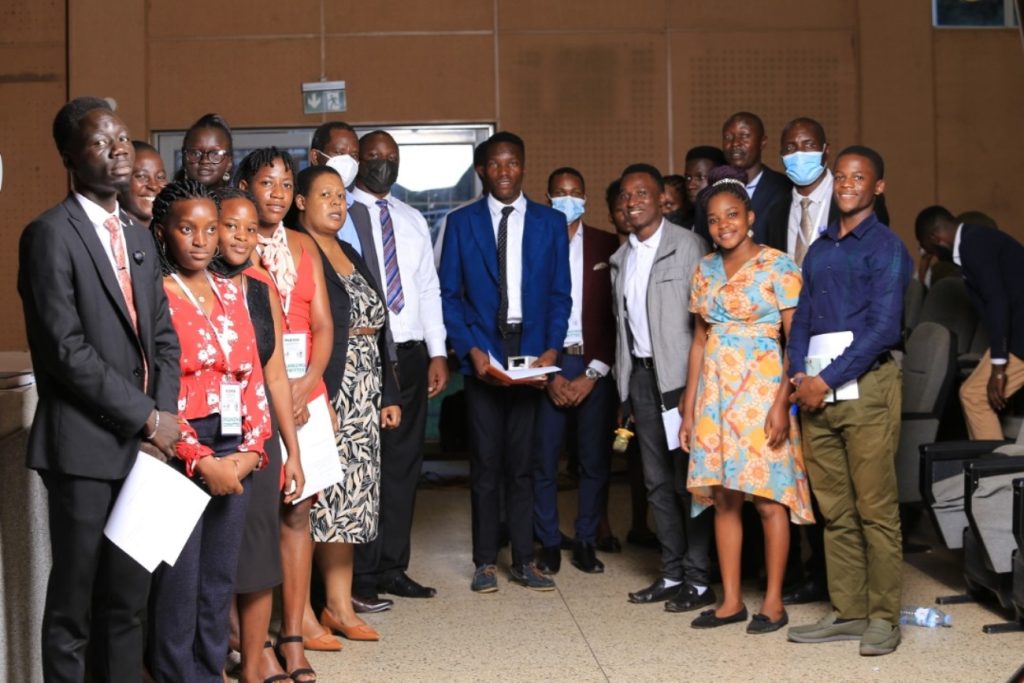
Background
Back in time, April 24, 2000 was the time when Kasozi Mohammed, a boda boda rider in Kampala and Pamela Nambusi gave birth to a young man, they later named Shafik Senkubuge. This was in the neighborhoods of Kawanda Namalere in Nangabo, Kyadondo, Central Uganda district of Wakiso. His family later shifted to Kagoma Village, in Maganjo Parish, Nabweru Subcounty and later went to Nansana Municipality, about 9.6km from the centre of Kampala, the capital of Uganda.
It is here that he calls home. He is the first born in a family of three, with two younger sisters. Recently, [his father] informed him about having two additional sisters. Despite communication between his parents, they do not reside together, and his father has a second wife.
At the moment, his father drives a motorcycle taxi (Boda Boda) out of Nabweru, a Kampala suburb which is close to Kawempe. The mother, who is self-employed, is starting a decorating company in Nansana. She’s presently setting up a small business that specializes in decorations for parties, graduations, and introductions.
A 2022 Twaweza report showed that Up to 55% of Ugandans who opened businesses in the past five years had to close them due to coronavirus disruptions, declining demand, and heavy taxation
Despite relying on her hair designer job for nearly her adult life, Pamela, Shafik’s mother could survive the pandemic. In 2020, she was forced to close down her saloon after she failed to raise the rent.
“During the lockdown, we had a lot of demands as a family and she couldn’t accommodate the saloon rent. She had a very huge debt that accumulated, the landlord decided to request her to leave the house for another person. She left the house, took all her equipment home and after COVID-19 she failed to resume the same business due to financial constraints,” Shafik narrates.
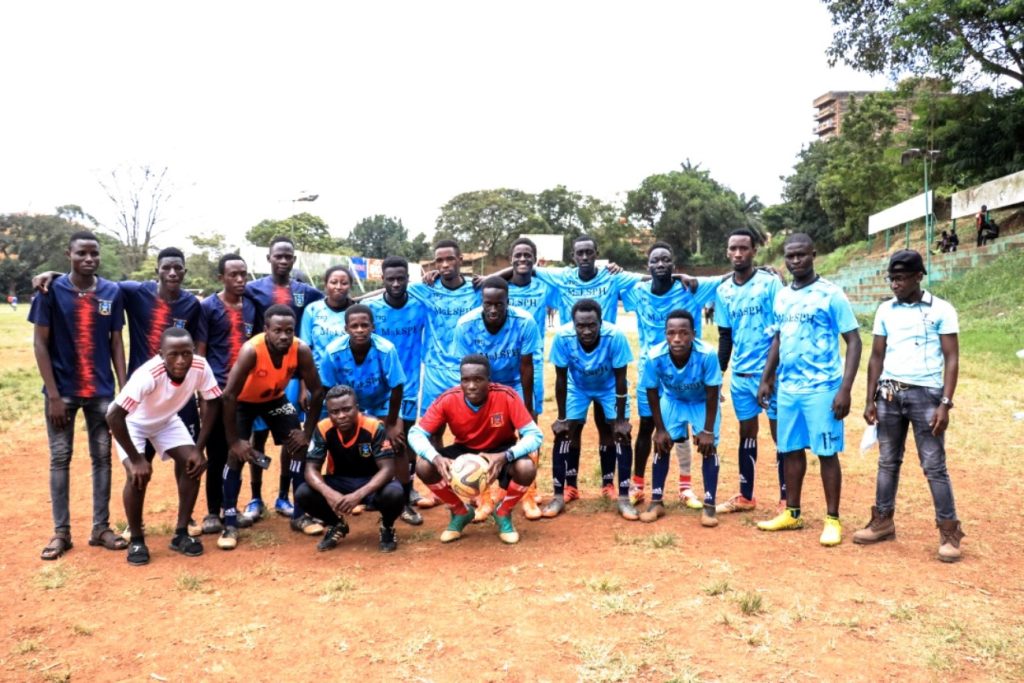
This happened a very critical time he was joining University. Fortunately for him, his mother had ventured into brick-laying during lockdown, and this is where he concentrated his energies to look for his tuition, if he was to ever join University.
Shafik’s academic journey began in 2004 at Kawempe Junior. A dedicated teacher at Melody Junior School that he joined later in 2009 ignited his interest in Science and Mathematics. This spark set the stage for his remarkable academic journey.
After completing primary two and crossing to primary three in 2008, his father had constructed a home in Nansana, where the family had to relocate to. In 2009, Shafik joined a new school – Melody Junior School in Nansana, a new environment, getting new friends.
At P.7, he became one of the only 4 first grades the school had, scoring 12 points.
“As the firstborn, my mother rejoiced, but concerns arose about my future after primary school due to financial constraints. Despite manageable primary school fees, I graduated with a debt. Upon retrieving my certificate, we settled the debt when I was already in senior one. My mother, balancing happiness and worries, pondered on how to secure my entry into secondary school, especially with my sister in primary five and our youngest sibling born in 2011, just around a year old,” recalls Shafik.
In 2014, still puzzled at the next step, his uncle, Patrick Ssenabulya, secured him a place through his NGO at St. Kizito Katikamu Kisule in Wobulenzi, Luweero district.
Starting secondary school in Luweero with a score of 12 aggregates among classmates with 4 and 6 aggregates, Shafik aimed to excel. Forming a close bond with his friend Kayondo Joseph, the duo navigated senior one to senior four together.
Despite facing math challenges, he encouraged me to confront them, and we succeeded. In the first term, he ranked 17th out of 178 students, bringing immense joy to my mother. The following term, he secured the third position, maintaining the second position consistently until completing senior four, including in UNEB exams
“When I went back home, my mom was very happy. I remember she slaughtered a chicken for me,” recalls Shafik.
St. Kizito Katikamu Kisule, a Catholic-founded school, groomed him and exposed his potential. “We used to go to church every day, they groomed us to be humble students and be disciplined. This helped us a lot and groomed us to be competitive even in academics,” he recalls
Despite obtaining 16 aggregates at Uganda Certificate of Education from this humble school, Shafik’s quest for a better education led him to Mengo Senior School, where he faced new challenges, including a shift from boarding to day school, walking long distances. Despite the obstacles, he maintained a strong work ethic, learning valuable lessons in time management and determination.
Her mother provided a Shs3000-transport allowance daily, covering both transport and break. He would skip the break tea to save part of the money for his transport back home in the evening. As such, he only used to have lunch to last until he left school at 5:00PM. This was the routine for the two years spent at Mengo SS, and his academic performance suffered significantly during that period.
“The first points I got were seven points, and this did not change up to our Mock examinations where I got to 10 points. Being at Mengo SS, made me learn even if you are brilliant, you need to have some extra tactics and thus we used to work so hard and we did serious calculations.
I remember sometimes we used to go to some other school, Kasubi Senior School, and read up until 10:00pm, then head back home. But by that, you are cutting a traffic jam that is usually there from around 8:00pm,” he recollects.
As he completed his Form 6, fate led him to a teaching position at his former primary school. The sudden closure of schools due to the pandemic forced him to adapt, and he embraced brickmaking as a means to sustain himself. The challenges were many, but Shafik’s resourcefulness and tenacity shone through.
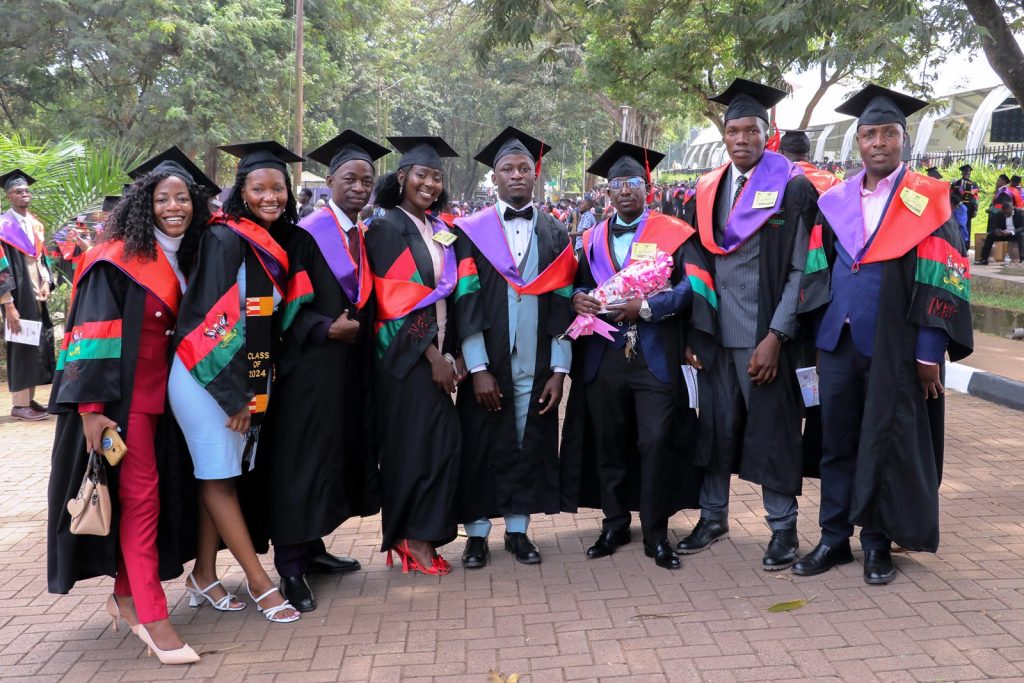
A few weeks into the semester, a second lockdown was announced by the president. This was according to him a blessing in disguise. He was uncertain how to clear tuition and registration.
A man named Longman Musige, a friend of my mother, promised to provide one million each semester. Although he already gave me one million, he still needed 1.8 million for semester registration.
“Upon reflection, we had crafted our bricks, but when the lockdown hit, we struggled to find funds to heat them and cover the remaining tuition. Despite burning the bricks, selling them proved challenging, leaving my mom anxious about my exam fees. Eventually, with support from Musawo Kaliro, contributions from friends, and brick sales, I managed to register for the online exams for the first semester,” he says.
Adding that; “Post-exams, my GPA stood at 4.9, providing a promising start towards achieving a first-class degree. Progressing through semester one and two, I maintained my diligence and benefited from my mom’s prayers. However, challenges arose during the exams in the second semester of year two.”
His classmates ran a campaign to raise him tuition but they could only raise Shs.1.4M from well-wishers out of the Shs.4.7million needed to clear the previous semester and the new semester.
His only hope was the Dean of MakSPH to whom he wrote a letter seeking financial assistance. “I detailed my financial situation, attached my results slip, and presented the funds I had collected. I was delighted to learn that she granted me a scholarship of 3.5 million. This not only cleared my backlog but also covered the third-year functional fees. With this support, I moved to University Hall for my third year, allowing me ample time for studies and fulfilling my leadership roles as MUEHSA president and college speaker.”
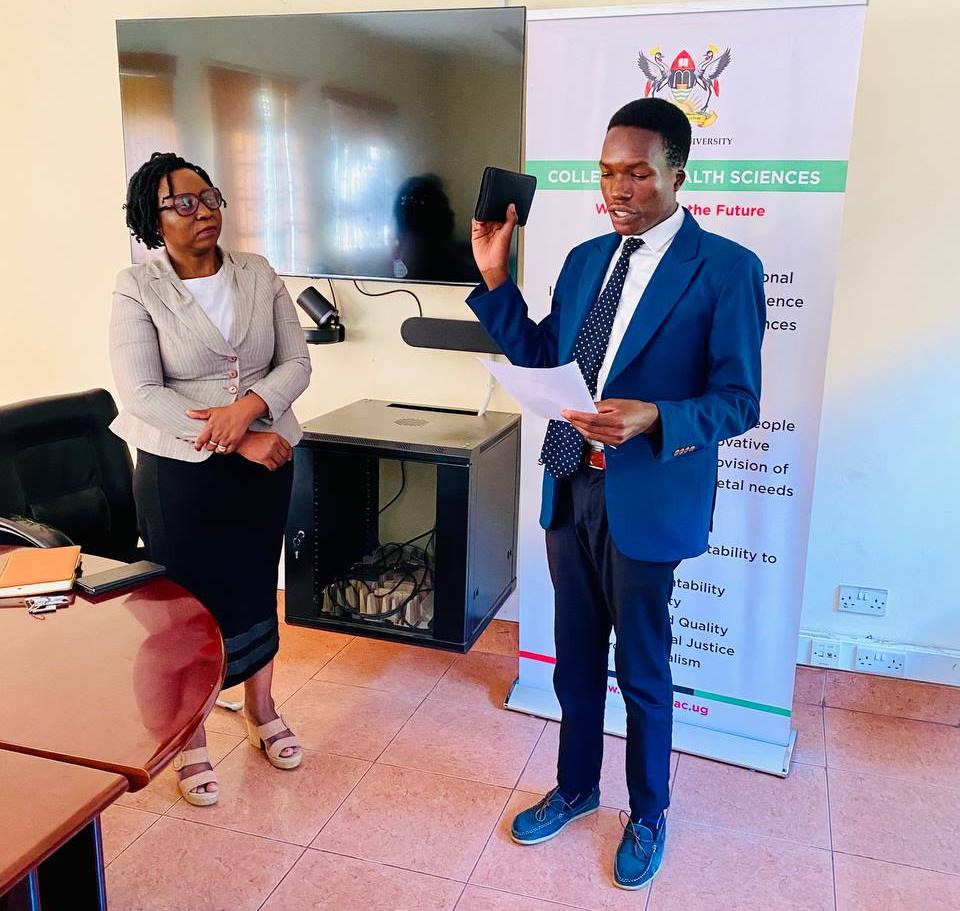
The ACMIS system at Makerere University faced a malfunction during the second semester of the first year in 2021, around the time the university was transitioning from AIMS to ACMIS. To Shafik, this was a golden chance to take exams without meeting the payment requirements.
Madvani Foundation Comes in handy
The twists and turns continued as he confronted financial obstacles, including unpaid tuition and the demands of a university education, even in his final year.
The scholarship however covered only tuition and not functional fees. This meant that he had to struggle to raise functional fees and accommodation, since he had moved to University Hall, a male student’s residence on campus.
Shafik’s involvement in student leadership, notably as the president of the Makerere University Environmental Health Students Association (MUEHSA), showcased his commitment to community engagement. Under his leadership, MUEHSA regained its lost glory, organizing conferences, community outreaches, and health education programs.
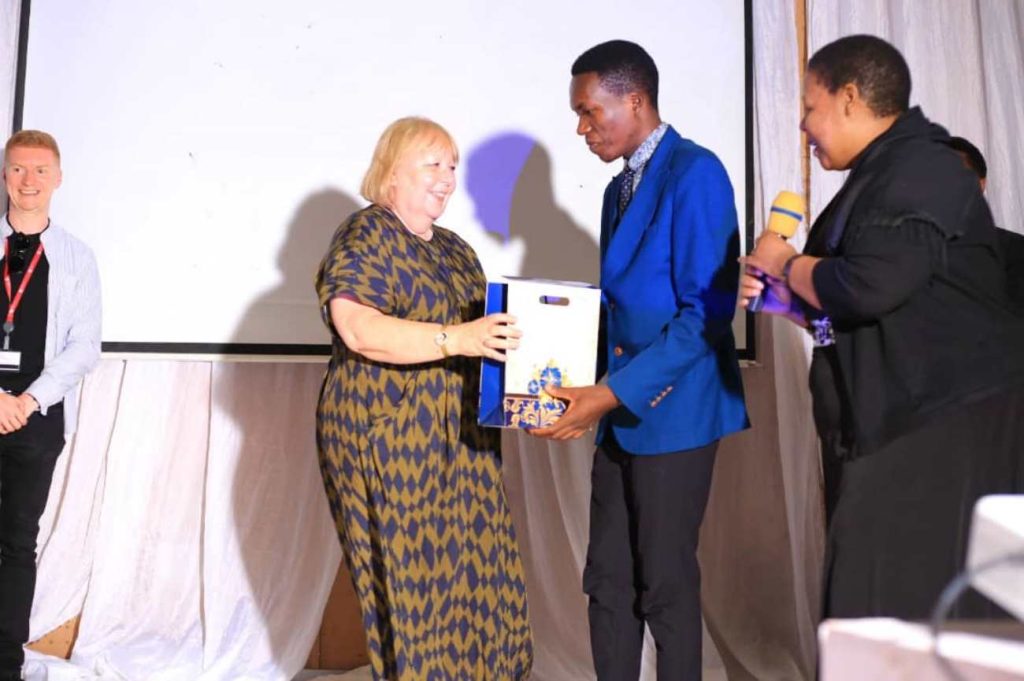
The pinnacle of his leadership journey was marked by the successful organization of the 18th Annual MUEHSA scientific conference, where stakeholders and students converged to discuss pressing environmental health issues. Shafik’s visionary leadership extended beyond MUEHSA, as he became the first College of Health Sciences speaker in the new guild system.
He sends his sincere gratitude to everyone who has been instrumental in mentoring him, especially Mrs. Ruth Mubeezi Neebye and Dr. David Musoke and his staff, whose advice has been priceless. He also extends gratitude to previous classmates. “To my colleagues, I would like to appreciate and congratulate them on this accomplishment. It has been quite a demanding task but we thank the almighty God who has enabled us to reach this far. Let’s remain with that bond, let’s remain friends, let’s not lose the connection and I know if we still work together as we have been working, the sky would be the limit,” he says.
You may like
-


Simplicity, Service & Scholarship: Hallmarks of Professor Livingstone Luboobi’s Legacy
-


Strengthening Grants Management Through Institutional Collaboration and Capacity Building
-


Makerere University Fees Waiver for 40 First Year Female Students 2025/2026
-
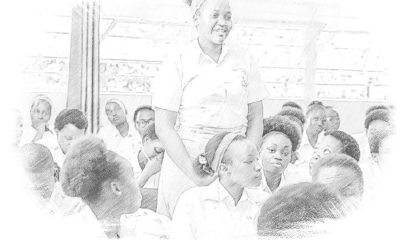

Ugandan Study Flags Girls and Senior Students as a Mental Health High-Risk Group
-


Call for Applications: Responsible Conduct of Research (RCR) Training Course
-
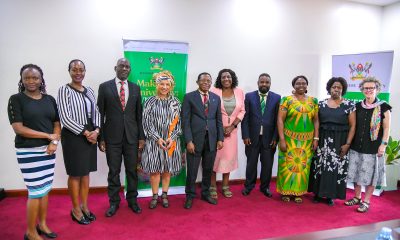

Mak, HERS-EA Discuss Nurturing More Women Leaders
General
Simplicity, Service & Scholarship: Hallmarks of Professor Livingstone Luboobi’s Legacy
Published
9 hours agoon
July 18, 2025By
Eve Nakyanzi
On Wednesday 16th July 2025, Makerere University lost one of its most cherished sons, Professor Livingstone Sserwadda Luboobi. Described as a mathematician, academic leader, and humble servant, Professor Luboobi devoted more than five decades to the university, rising through the ranks to become Vice Chancellor, and leaving a legacy defined by simplicity, service, and scholarship.
Born to Lameka Serwadda and Sanyu Serwadda on 25th December 1944 in Mitondo, Kalisizo, Kyotera District, Professor Luboobi’s academic career begun as a third-year student at Makerere and continued with unwavering loyalty until his passing. His life’s work reflected not only a commitment to mathematics but also nurturing generations of scholars and leaders across Uganda and beyond.
A funeral service was held in his honour at St. Francis Chapel, Makerere University on 18th July 2025. It was a moment of solemn remembrance and heartfelt tribute. Rev. Canon Dr. John Senyonyi delivered the sermon titled “Only God Knows,” reminding mourners of the mystery and grace of life’s journey. Rev. Canon Geoffrey Byarugaba represented the Kampala Diocese at the service, while former St. Francis Chaplain, Rev. Dr. Canon Johnson Ebong thanked Professor Luboobi for spearheading the Chapel’s expansion. Friends, colleagues, and family members filled the chapel, joined in mourning but also in gratitude for a life that had deeply touched theirs.

Mrs. Lorna Magara, Chairperson of the University Council, spoke movingly about Professor Luboobi’s faithfulness, likening his life to the biblical call in Mark 10:43, “Whoever wants to become great among you must be your servant.”
In his condolence message, the Vice Chancellor, Professor Barnabas Nawangwe, hailed Professor Luboobi as a visionary leader whose legacy is deeply woven into Makerere’s identity as a research-led institution. He credited Professor Luboobi with laying the groundwork for a culture of inquiry—championing graduate programmes, encouraging doctoral training, and fostering international collaborations that strengthened the university’s research profile. “He believed in building systems, not just structures,” noting that many of Makerere’s current research policies stem from his leadership. Even in retirement, Professor Luboobi remained a source of wisdom and guidance, quietly shaping the future of the university he so deeply loved.
Speaker after speaker painted a portrait of a man who led not by pomp, but by quiet strength and deep conviction. The Principal, Professor Winston Tumps Ireeta, speaking on behalf of the College of Natural Sciences (CoNAS), described Professor Luboobi as a foundational figure whose influence is deeply etched in the structures and spirit of the college. He spoke with emotion about Luboobi’s unwavering commitment to academic integrity and his belief in the power of mentorship.

“He was not just a mathematician,” Professor Ireeta said, “he was a visionary who understood the soul of the university. Even in retirement, he remained an advisor, a guide, and a quiet force of wisdom.” He concluded by saying that the college would continue to draw from his example as it navigates the future of science and innovation in Uganda.
Professor Luboobi’s illustrious career at Makerere University included serving as Head, Department of Mathematics from 1990 to 1991. The current Head of Department, Dr. Ismail Mirumbe remembered him as a pillar in the teaching and development of mathematics in Uganda
Professor John Mango, who served as Head, Department of Mathematics during Professor Luboobi’s term as Vice Chancellor from 2004 to 2009 described him as a towering figure of integrity and principle, someone who not only upheld the highest standards of academic conduct but insisted that others around him do the same. “He was a pillar in the department,” Prof. Mango remarked, “and his moral compass was unwavering.”

He recalled instances where Professor Luboobi made firm decisions, including terminating contracts when integrity was compromised, setting a tone that shaped the department’s reputation for honesty and excellence. Even as Vice Chancellor, he remained deeply involved in the department’s affairs, teaching, supervising students, all the while handling top administrative duties punctually. Prof. Mango spoke with great admiration of a man who led by example, mentored many, and whose contributions to mathematics education, research, and policy-making continue to shape the future of the discipline in Uganda and beyond.
According to an article from 1990 written by Dr. Vincent Ssembatya and Andrew Vince at the University of Florida, the Uganda Mathematical Society (UMS), which was formally established on 25th November, 1972 has since inception enjoyed major support from Makerere University and Kyambogo University in terms of infrastructure and leadership. Professor Paul Mugambi, who was also present at Professor Luboobi’s funeral service was elected first president of the UMS. Dr. Saul Nsubuga from the Department of Mathematics represented UMS at the service, honouring Professor Luboobi’s pioneering role in the discipline.
The service also featured tributes from close friends and family. Loved ones shared stories of a man who remained grounded no matter how high he rose, a man who valued relationships and walked closely with his faith. His children and grandchildren remembered him as a father who was ever-present, a listener, and a source of steady guidance.

Professor Daniel Kibuule, son of the late Professor Luboobi and Dean, Faculty of Health Sciences at Busitema University, delivered a deeply personal tribute that painted a full portrait of his father’s life, values, and final days. He expressed gratitude to the University leadership, family, friends, and medical professionals who stood with them during a challenging period. He particularly thanked his siblings, Dr. David Kimera and Dr. Irene Nakiyimba for their unwavering role in caring for Professor Luboobi through illness.
He spoke of a man who, despite great academic accolades, remained deeply humble and committed to discipline, simplicity, and faith. From instilling punctuality and responsibility to ensuring his children charted their own paths, none bearing his surname “Luboobi”, Prof. Luboobi was intentional in every lesson he passed on. Kibuule recalled his father’s insistence on being at home even in his final moments, his strong connection to Christ, and his quiet strength despite his failing health.
Former students and mentees echoed the same sentiments, of a teacher who was generous with his time and invested deeply in others’ growth. The community that gathered was not only there to grieve but to celebrate the quiet legacy of a man whose example continues to live on.
Among the mourners were public figures and leaders, including Hon. Abed Bwanika, Member of Parliament for Kimanya-Kabonera, Hon. Nyombi Thembo, the Executive Director Uganda Communications Commission, and Hon. Dr. Ham-Mukasa Mulira, former Minister of ICT, among others.
In his passing, Makerere University has lost a pillar, but his life reminds us that greatness lies in consistency, in humility, and in service to others. Professor Luboobi’s memory will continue to live on in the minds he shaped, the systems he built, and the values he embodied. He ran his race with grace.
The Writer is a Volunteer in the Public Relations Office, Makerere University
Please click the embedded video below to view the service livestream
General
Public University Legal and Accounting Officers Trained on Governance and Compliance
Published
2 days agoon
July 17, 2025By
Eve Nakyanzi
Legal and accounting officers from public universities across Uganda have convened, for a high-level training workshop organized by Makerere University. The three-day training, taking place from July 16th to 18th, 2025, is aimed at strengthening legal frameworks, improving institutional governance, and ensuring compliance with public finance and procurement laws within higher education institutions.
Ms. Lorna Magara, Chairperson of the Makerere University Council and Guest of Honour at the opening session, commended the initiative as timely and necessary. She addressed the growing backlog of court cases affecting Makerere and other public universities and outlined measures already taken to mitigate legal risks. These include the establishment of a Legal Rules and Privileges Committee and the Directorate of Legal Affairs, part of a broader strategy to improve legal compliance and foster good governance.
Representing the Vice Chancellor, Prof. Winston Tumps – Ag. Deputy Vice Chancellor (Finance and Administration), described the training as both strategic and practical. “It is imperative that we learn from each other, especially in how we handle employee litigation and institutional legal risks,” he remarked. He added that the program is designed to promote experience-sharing across universities and enhance collective institutional growth.

In his address, Mr. Yusuf Kiranda, University Secretary at Makerere University, emphasized the urgent need for robust legal oversight and more effective case management mechanisms within public universities.
The training featured a keynote address by the Attorney General of Uganda, Hon. Kiryowa Kiwanuka, who provided critical insights into legal expectations for public institutions. He warned that failure to heed legal advice could result in personal liability for accounting officers, citing a precedent involving the Uganda Cancer Institute. “Universities must consult the Attorney General’s chambers before entering into major contractual obligations,” he advised, urging legal officers to document decisions meticulously as proper record-keeping forms the first line of defense in legal disputes.

Hon. Kiwanuka further discussed the government’s ongoing efforts to recentralize legal services to ensure alignment with the Attorney General’s office. He cautioned in-house counsel against becoming overly entangled in decision-making processes, stressing the need for objectivity. Other key issues he addressed included contract approvals, misuse of Memoranda of Understanding (MoUs), and lapses in procurement processes, particularly at the close of financial years.
Participants also benefited from insights by Hon. Justice Musa Ssekaana of the Court of Appeal, who offered an in-depth analysis of judicial review and its significance in promoting lawful, transparent university governance. He called on university legal officers to act with clarity, timeliness, and accountability.
Lady Justice Joyce Kavuma, Judge of the High Court, delivered a comprehensive presentation on dispute and claim management involving public universities. She addressed emerging trends in civil litigation, emphasizing the importance of due process, transparency, and clear communication in resolving employment, student, and contractual disputes. Drawing on real case examples, she urged institutions to strengthen internal systems, embrace participatory governance, and adopt regional best practices to minimize litigation and protect institutional reputation.

The training reflects a shared commitment among public universities to build a more accountable, legally sound, and strategically aligned higher education system in Uganda. Through peer learning and collaboration, participating institutions aim to reduce litigation, enhance institutional autonomy, and uphold the rule of law.
Participating universities include Makerere University, Kyambogo University, Mbarara University of Science and Technology, Busitema University, Mountains of the Moon University, and Lira University.
The training concludes on July 18th 2025, with sessions focusing on employment dispute management in public universities and the implications of recent PPDA Appeals Tribunal decisions on procurement and disposal practices within public entities.
General
Celebrating the Life of Prof. Livingstone Sserwadda Luboobi
Published
2 days agoon
July 17, 2025By
Mak Editor
A Visionary Leader, Seasoned Mathematician, & Humble Academician
It is with profound love and respect that we celebrate the life of Prof. Livingstone Sserwadda Luboobi, a distinguished scholar, transformative leader, and beloved Vice Chancellor Emeritus of Makerere University. His legacy is woven in the fabric of African higher education, marked by intellectual brilliance, unwavering commitment to academic excellence, and a life of selfless service.
A Life of Purpose and Vision
Prof. Luboobi was more than a mathematician. He was a visionary, whose work transcended equations and research papers. Serving as Vice Chancellor from 2004 to 2009, he led Makerere University through a critical period of growth and transformation. Under his guidance, the university expanded its reach, strengthened its academic rigor, and embraced innovation and reform. His calm demeanour and principled decision-making earned the admiration of students, faculty, and peers alike.
Prof. Luboobi was deeply committed to nurturing talent and fostering intellectual curiosity, leaving an indelible mark on the institution’s culture and future direction.
Beyond Uganda, Prof. Luboobi’s influence resonated across the global academic community. He was a passionate advocate for the transformative power of science and education, often speaking at international forums and collaborating on research that bridged continents and disciplines. His work helped elevate the profile of African scholarship on the world stage.
His legacy endures not only in the impressive body of work he left behind but also in the countless lives he touched – students, educators, and leaders who continue to draw inspiration from him.
Academic and Leadership Journey at Makerere University
An illustrious alumnus of Makerere University, Prof. Luboobi graduated with First Class Honours in Mathematics, laying the foundation for an extraordinary academic journey. He pursued further studies at the University of Toronto (MSc in Operations Research, 1971-72) and the University of Adelaide (PhD in Biomathematics, 1978–80). His scholarly journey spanned prestigious institutions worldwide, including UCLA, the University of Bergen, and the University of Dar es Salaam, establishing him as a scholar of global repute and a proud ambassador of African intellectualism.
Prof. Luboobi’s service to Makerere begun in 1970 as a Special Assistant-remarkably, while still an undergraduate, rising through the ranks to full Professor in 1997. He served as Head of Department, Dean of the Faculty of Science (1994–2001), and later became the university’s first elected Vice Chancellor. His tenure brought new energy to institutional leadership, characterized by transparency, inclusivity, strategic direction and accountability.
Strategic Reforms and Institutional Impact
A true architect of transformation, Prof. Luboobi chaired the development of Makerere’s first locally-conceived Strategic Plan (1990–91). He was instrumental in securing a UGX30 billion grant from NORAD in 1999, which revitalized key academic areas such as computing, gender studies, and food science. He co-founded the Makerere University Private Sector Forum, bridging the gap between academia and industry, and strengthening alumni engagement and resource mobilization.
Pioneering Biomathematics and Mentorship
As one of Africa’s pioneering biomathematicians, Prof. Luboobi introduced mathematical modeling to tackle real-world problems in epidemiology, ecology, and operations research. His scholarly contributions – over 150 publications – reflect the depth and breadth of his research. Yet, perhaps his most lasting impact lies in mentorship: he supervised more than 35 PhD and over 50 MSc students, including Makerere’s first female PhD graduate in Mathematics, nurturing a generation of scholars and leaders.
Prof. Luboobi’s Contribution to the Internationalization of Makerere University
Prof. Luboobi played a pivotal role in advancing the international profile of Makerere University. Demonstrating remarkable personal commitment, he utilized his own resources to support the establishment of the University’s International Office. This strategic initiative laid the foundation for a more structured and effective engagement with global academic institutions, development partners, and international students. As a result, Makerere University significantly enhanced its global footprint, forming numerous international collaborations and attracting increased academic and research opportunities from abroad.
In addition to his contributions to internationalization, Prof. Luboobi was also instrumental in revitalizing the University’s Public Relations Unit. Under his guidance, the unit adopted more proactive and professional communication strategies, which greatly improved the institution’s public image. This, in turn, fostered greater public trust and strengthened the university’s reputation both locally and internationally. His visionary leadership in these areas has had a lasting impact, positioning Makerere University as a leading institution in East Africa and beyond.
Global Recognition and Enduring Legacy
Prof. Luboobi’s contributions earned him widespread recognition. In 2008, the University of Bergen awarded him an Honorary Doctorate for his role in internationalizing academia. Makerere University honoured him with a Lifetime Achievement Award in 2013, and the Government of Uganda conferred upon him a National Gold Medal for his unwavering service to education and national development.
Even after retirement, Prof. Luboobi remained an active contributor to academic life-lecturing, supervising, and advising the university.
A Lasting Light in African Academia
Prof. Livingstone Sserwadda Luboobi’s life was a model of scholarship anchored in service, leadership tempered with humility, and an unshakable belief in the power of education. He leaves behind a vibrant academic legacy and a trail of inspired minds. His contributions will continue to shape Makerere University, Uganda, and the global academic community for generations to come.
We extend our heartfelt condolences to his family, colleagues, and the entire Makerere University community during this difficult time.
May his soul rest in eternal peace.
Trending
-

 General2 weeks ago
General2 weeks agoRe-advert: Admission to Undergraduate Programmes 2025/2026
-

 General1 week ago
General1 week agoRe-Advert for Applications for Diploma and Certificate Training
-

 General5 days ago
General5 days agoMakerere University Fees Waiver for 40 First Year Female Students 2025/2026
-

 General2 weeks ago
General2 weeks agoPress Statement on Ranking
-

 Health1 week ago
Health1 week agoCall for Applications: Responsible Conduct of Research (RCR) Training Course
